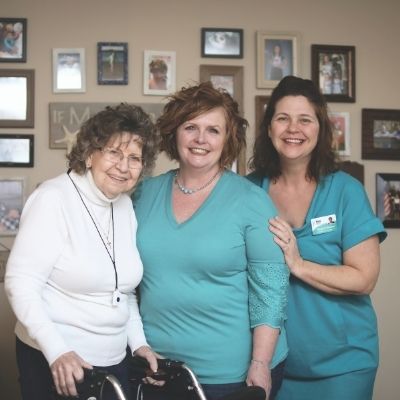Service Spotlight: Consumer Directed Care
A nationwide shortage of qualified home health workers is making it difficult to provide critical in-home care services for older adults in southwestern Ohio, but Council on Aging (COA) has added flexibility to its largest program – the Elderly Services Program (ESP) – so families have other options when they need care.
Locally, the national aide shortage is making it difficult for traditional home health agencies to recruit and retain aides. COA contracts with these providers to deliver in-home services to clients enrolled in its programs. As a result, older adults who rely on this critical care – including those enrolled in ESP – experience delays in starting their services, irregularities in their service schedule and inconsistencies in the aide who provides their care.
One way COA has tried to alleviate some of the disruption caused by the aide shortage is to give clients and families the ability to hire their own workers.
That was the case for Warren County ESP client, Chris, 81. A traditional home health aide helped her with personal care, housekeeping and errands. But Chris’ daughter, Cheryl, and her niece, Lynn, were stepping in more and more to provide care, taking time away from work and other family responsibilities.

Then Chris’ ESP care manager, Maggie, told the family about an option available to ESP clients. Called consumer-directed care (CDC), COA added this option to ESP in Butler, Clinton, Hamilton and Warren counties as a way to help alleviate local service problems caused by the home health aide shortage.
Here’s how it works: Instead of using a home care agency, clients become “employers” and hire their own “employees” to provide certain authorized services, which are paid for by ESP. In many cases, the employee is someone the client already knows – a relative or friend. CDC increases independence and program satisfaction for the client, while using ESP resources more effectively.
In Chris’ case, her niece, Lynn, was hired as her aide. Lynn helped Chris with everything a traditional aide would do – cleaning, laundry, shopping and bathing. CDC offers more flexibility in the services the aide can provide. For example, Lynn provides transportation to Chris’ appointments.
ESP care manager, Maggie, helped the family enroll in CDC. As the administrator for ESP, Council on Aging contracts with a Financial Management Services (FMS) provider to make the process of being an “employer” easier on clients and their families. The FMS provider, on the client’s behalf, manages all the financial- and payroll-related responsibilities, in addition to criminal background checks that go along with being an employer.
COA recently rebid this service and selected Palco, Inc. from among the qualified bidders. The new contract took effect in January 2022 and the process of transitioning current CDC clients is now under way.
“The new contract with Palco could not have come at a better time,” said Ken Wilson, COA’s vice president of program operations. “The aide shortage is impacting ESP’s ability to match clients with home health aides through traditional avenues such as home care agencies. The FMS provider is a key partner in helping us expand the consumer-directed care option of ESP, enabling older adults to work outside of those traditional sources to hire their own aides or caregivers.”
Wilson added that Palco has a history of working with older adults who use programs like ESP to hire their own aides. He said with the transition to Palco, clients who hire their own caregiver can expect a faster enrollment process with expert customer support. “Ultimately, this means we’ll be able to expand the consumer-directed care service to more older adults,” Wilson said.
Nodding in Lynn’s direction, Chris said, “This one has saved my life. I would have been in a nursing home without her.”
Cheryl, Chris’ daughter, works full time but lives nearby and stays involved in her mother’s care. “Lynn is a Godsend,” Cheryl said. “That’s all I can say. I do what I can for my mom – visiting and cooking – but I wouldn’t be able to work without ESP.”
Anyone interested in learning more about the consumer-directed care option of the Elderly Services Program can use the phone numbers below for information:
- Hamilton County: call (513) 721-1025 or (800) 252-0155, Option 2
- Clinton County: call (937) 584-7200 or (800) 252-0155
- Butler County: call (513) 868-9281
- Warren County: call (513) 695-2271
Part of this story was first featured in the Warren County Elderly Services Program 2018 Annual Report.
